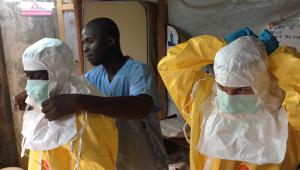By Judith Ugwumadu | 17 September 2014
The economic impact of the Ebola outbreak could grow eight-fold in the three worst-affected countries, dealing a potentially catastrophic blow to the already fragile states of West Africa, the World Bank has warned.
It found that the largest economic impact of the virus resulted from behaviour associated with the fear of contagion, not the disease itself, particularly in Guinea, Liberia, and Sierra Leone.
This in turn led to fear of association with others and reduced labour force participation, closed places of employment, disrupted transport, and closed seaports and airports.
However, the bank said that if swift national and international responses succeeded in containing the epidemic and mitigating ‘aversion behaviour’, then economic costs could be limited. To achieve this, fiscal support of $290m is needed to get the affected economies back on the track, the bank said.
It added that it was mobilising a $230m financing package for the three countries. The funds would help to contain the spread of infections, help communities cope with the economic impact of the crisis and improve public health systems throughout West Africa.
World Bank president Jim Yong Kim said: ‘The primary cost of this tragic outbreak is in human lives and suffering, which has already been terribly difficult to bear.
‘But our findings make clear that the sooner we get an adequate containment response and decrease the level of fear and uncertainly, the faster we can blunt Ebola’s economic impact.
‘We have seen in recent days a serious scaling up on the part of international donors to contain the Ebola epidemic. Today’s report underscores the huge potential costs of the epidemic if we don’t ramp up our efforts to stop it now.’
The bank has estimated the short-term impact on output to be 2.1 percentage points of GDP in Guinea, 3.4 percentage points of GDP in Liberia and 3.3 percentage points of GDP in Sierra Leone. This decline in output reaches $359m in 2014 prices. However, if Ebola is not contained, these estimates grow to $809m in the three countries alone, the bank cautioned.
Inflation and food prices had been initially contained but were now rising because of shortages, panic buying and speculation, the bank said. Exchange rate volatility had also increased in all three countries, particularly since June, fuelled by uncertainty and some capital flight.
The bank urged a rigorous international response. It stated that external financing was clearly needed in the three core countries, while its economic impact estimates suggested that containment and mitigation expenditures as ‘high as several billion dollars’ would be cost-effective if they successfully avert the worst scenario.













